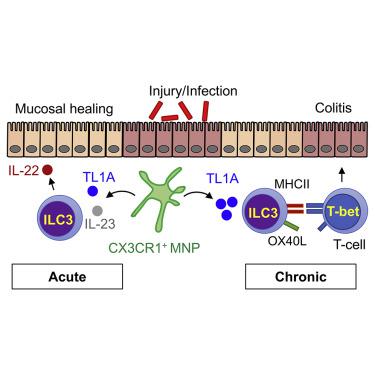Our official English website, www.x-mol.net, welcomes your
feedback! (Note: you will need to create a separate account there.)
Microbiota-Induced TNF-like Ligand 1A Drives Group 3 Innate Lymphoid Cell-Mediated Barrier Protection and Intestinal T Cell Activation during Colitis.
Immunity ( IF 25.5 ) Pub Date : 2018-12-11 , DOI: 10.1016/j.immuni.2018.10.014 Jim G Castellanos 1 , Viola Woo 1 , Monica Viladomiu 1 , Gregory Putzel 1 , Svetlana Lima 1 , Gretchen E Diehl 2 , Andrew R Marderstein 1 , Jorge Gandara 1 , Alexendar R Perez 1 , David R Withers 3 , Stephan R Targan 4 , David Q Shih 4 , Ellen J Scherl 5 , Randy S Longman 6
Immunity ( IF 25.5 ) Pub Date : 2018-12-11 , DOI: 10.1016/j.immuni.2018.10.014 Jim G Castellanos 1 , Viola Woo 1 , Monica Viladomiu 1 , Gregory Putzel 1 , Svetlana Lima 1 , Gretchen E Diehl 2 , Andrew R Marderstein 1 , Jorge Gandara 1 , Alexendar R Perez 1 , David R Withers 3 , Stephan R Targan 4 , David Q Shih 4 , Ellen J Scherl 5 , Randy S Longman 6
Affiliation

|
Inflammatory bowel disease (IBD) results from a dysregulated interaction between the microbiota and a genetically susceptible host. Genetic studies have linked TNFSF15 polymorphisms and its protein TNF-like ligand 1A (TL1A) with IBD, but the functional role of TL1A is not known. Here, we found that adherent IBD-associated microbiota induced TL1A release from CX3CR1+ mononuclear phagocytes (MNPs). Using cell-specific genetic deletion models, we identified an essential role for CX3CR1+MNP-derived TL1A in driving group 3 innate lymphoid cell (ILC3) production of interleukin-22 and mucosal healing during acute colitis. In contrast to this protective role in acute colitis, TL1A-dependent expression of co-stimulatory molecule OX40L in MHCII+ ILC3s during colitis led to co-stimulation of antigen-specific T cells that was required for chronic T cell colitis. These results identify a role for ILC3s in activating intestinal T cells and reveal a central role for TL1A in promoting ILC3 barrier immunity during colitis.
更新日期:2018-12-11






























 京公网安备 11010802027423号
京公网安备 11010802027423号